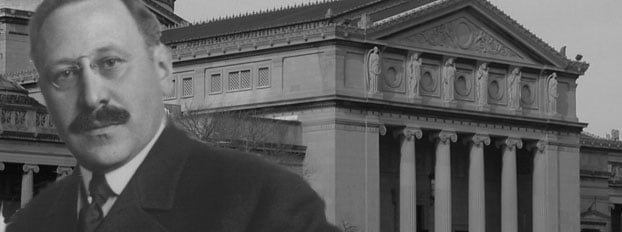
From Sears to Eternity: the Julius Rosenwald Story
"History hasn't remembered
him as well as some other, less humble philanthropists," said Chicago
Stories host John Callaway, "but he was one of the greatest men
in the history of Chicago."
Julius Rosenwald (1862-1932) founded the Museum
of Science and Industry and built Sears
Roebuck into the America's leading mail order house. But his most lasting
legacy may be little known. Rosenwald, the son of German-Jewish immigrants,
rose to become one of the wealthiest men in America as well as a beloved
humanitarian whose commitment to social justice lead to historic change
for black Americans.
Influenced by the social gospel espoused by Rabbi Emil Hirsch of Chicago
Sinai Congregation, Rosenwald used his great wealth and talent for leadership
to try to fix what he viewed as wrong with the world. All told, he gave
away $63 million, which in today's dollars is more than ten times that
amount.
Rosenwald took a leadership role in establishing social services to meet
the needs of some 100,000 impoverished Jewish immigrants who settled in
Chicago at the turn of the 20th century and, later, in uniting the city's
splintered German and Eastern European Jewish communities. In 1923, Rosenwald
became first president of the combined Jewish Charities of Chicago, forerunner
to today's Jewish Federation of Metropolitan Chicago.
Inspired by Booker T. Washington, Rosenwald spurred the establishment of
25 YMCA-YWCAs to serve African-Americans in cities across the U.S., including
the Wabash Avenue YMCA in Chicago. (Existing Y's at the time served only
whites.) In addition, he established one of the nation's first housing
projects, on Chicago's South Side, and, with challenge grants, seeded the
creation of more than 5,000 schools for black children in southern states
at a time when few received any public education.
Comments by Peter Ascoli
I think the thing that he was the most proud of was his work with African
Americans, specifically the schools, but also the YMCA, and so many of
the various other projects with blacks that he was involved in.
In 1928, he was awarded the Race Relations Award by the Harman Foundation.
And although he couldn't actually pick up the award in person, because
at that time his wife Gussie was very ill and the two of them were in Florida
where she was recuperating, nevertheless he was immensely proud to have
received this award. I really think he felt that in this particular area,
he had made a tremendous difference, as indeed he did.
He would be disappointed in the fact that he was never able to see the Museum
of Science and Industry open. This was his brainchild. He had thought
it up. He had nursed it along. He had seen it through thick and thin. There
had been all these roadblocks thrown in its way, and yet he died just before
the building could open up initially in 1933. I think that he would be
very proud of the museum today. First of all, it's being seen by enormous
numbers of people. Secondly, its educational component, because one of
the things that really impressed him about the need for such a museum was
as an educational tool, as he made very clear. And so the fact that there
are literally thousands of school children who go through this museum every
year is something that would really please him. And finally, I think he
would be glad that the museum is being supported by a large number of people,
because when he built it, he was virtually the only supporter of it. It
was during the Depression and although he hoped that others were going
to come along and help support it, at that time nobody was particularly
interested in doing so. They all had their own problems. And so it ended
up that Rosenwald and his family and his estate ended up giving $10 million
to the museum up until the early forties, and the most that had been collected
from any other individual source was some $16,000. He wanted other people
to participate, and so the fact that the museum now has lots of funders
is something that I think he would be very pleased about.
Of course he was not a saint. I think that he could be certainly difficult
to work for. He could be brusque. He could occasionally even be rude. But
in the scale of things, he was a pretty good individual. There were many
qualities about him that many people would have found and did find to be
absolutely admirable. Not only his generosity, but the thoughtfulness that
lay behind it, his willingness to work for the causes that he believed
in, all of these things, his willingness to take risks in terms of funding
and other things. I mean, there weren't exactly huge numbers of people
who were giving money to African Americans in those days. And his Rosenwald
Schools were something that was really unique. Even the General Education
Board, which is the Rockefeller Foundation offshoot, which was supposed
to fund education for whites and blacks, in the first decade of its existence
from 1902 to 1912, funded almost exclusively white things because they
were afraid of riling Southern sensibilities. J.R. didn't give a hoot about
Southern sensibilities. He thought that this was a great idea, schools
for blacks in rural areas, and he was determined to go ahead and it didn't
matter what the results were going to be. And I think that kind of bravery
and doggedness, if you will, was entirely admirable.
Peter Ascoli is Julius Rosenwald's grandson and biographer.
Robert Blattberg on Rosenwald's Role at Sears
Rosenwald created a structure that allowed Sears to be successful. Richard
Sears was a great marketer, but he didn't really have the internal structure
to turn Sears into what it became. Julius Rosenwald, in a way, was a person
behind the scenes. He was, in today's terms, the Chief Operating Officer.
But he was the genius behind the company.
He was like Sam Walton. Sam Walton understood concepts like logistics,
moving the product from a manufacturer's warehouse to his distribution
center to his stores. Julius Rosenwald did the same thing, except he figured
out how you get product out to rural America in a time period when there
weren't telephones, there weren't computers, there wasn't all the modern
technology that exists today. It was done by railroad, and by horses and
carriages, moving heavy appliances, moving furniture, moving clothing.
So he was a genius before his time.
And if you look at what's gone wrong with most of the e-tailers today,
it's the lack of ability to efficiently deliver product. Now people may
think that that's a minor issue, but one of the reasons those companies
don't make money is because they have not figured out how to efficiently
deliver the product from the manufacturer through their distribution centers
to the consumer. They can't do it cost-effectively. Julius Rosenwald was
doing it in the year 1900, and recognized how critical it was. So ironically,
in today's world, he'd be more sought after than he was in the year 1900.
Robert Blattberg is a Professor of Marketing at Northwestern University.
About the Program Producer
Beverly Siegel also produced "Romance of a PeopleÑThe First 100 Years of
Jewish Life in Chicago: 1833-1933," which aired last season on Chicago
Stories. Ms. Siegel found narrowing Julius Rosenwald's achievements
to fit a half-hour format a formidable challenge. Citing his association
with Jane Addams and the University of Chicago, as well as his agricultural
colonies in Russia that provided a livelihood for tens of thousands of
Jews, Siegel says, "Rosenwald made many important contributions that will
have to be covered in another show."

Your $40 Gift Membership will include:
|
























































